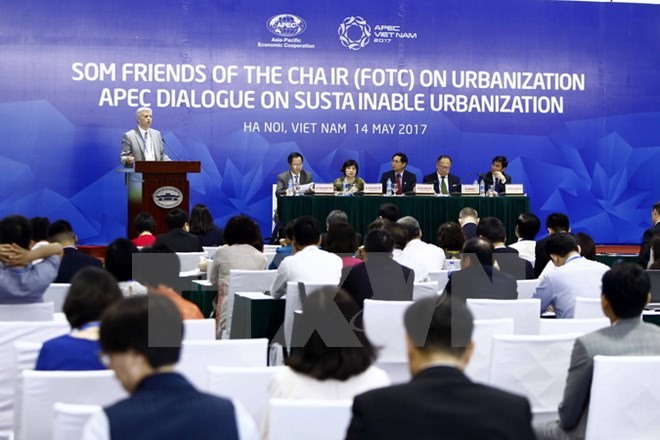 Society
Society

As a dynamic region with rapid economic growth, the Asia-Pacific region has become a primary driving force for the global economy thanks to its abundant human resources with high skills, which are effectively combined with quality institutional frameworks and close collaboration among member economies, said a Vietnamese official.
 |
| The 42nd Plenary Meeting of the Human Resources Development Working Group (HRDWG) takes place in Hà Nội on Sunday. — VNA/VNS Photo An Đăng |
HÀ NỘI — As a dynamic region with rapid economic growth, the Asia-Pacific region has become a primary driving force for the global economy thanks to its abundant human resources with high skills, which are effectively combined with quality institutional frameworks and close collaboration among member economies, said a Vietnamese official.
In his opening remark at the 42nd Plenary Meeting of the Human Resources Development Working Group (HRDWG) on Sunday, Deputy Minister of Labour, Invalids and Social Affairs Doãn Mậu Diệp said the high quality human resources are increasingly important for the development of each country, since both the world and region are experiencing large changes under the impacts of the fourth industrial revolution, especially digital technology.
“Our urgent task is to promote regional cooperation, study and make timely assessments on the impacts of digital technology on human resources development, based on which is the proposing of pioneer solutions to increase the adaptability of the labour force in the digital age,” he said.
Diệp expressed his hope that the meeting would focus discussions on the Framework of Human Resources Development in the Digital Age for consensus.
If approved, this will be the outcome document of the APEC High-level Policy Dialogue on Human Resources Development in the Digital Age, with significant contributions to the development of high quality human resources, enhancement of job quality and connection among people in the APEC region, he added.
Talking with Vietnam News Agency (VNA) on the sidelines of the meeting, Christina Maria Schonleber, Vice Director (International Secretariat) of the Association of Pacific Rim Universities (APRU), said the fourth industrial revolution will benefit the labour market, especially in the digital age, and create opportunities for development of skills, with the assistance of new technologies.
The development of the digital age will lay a foundation for development in the future, she said, adding that the labour market needs to develop further, particularly enhancing transnational connections and expanding vocational training.
Established in 1990, the HRDWG has conducted work programmes on developing human resources, touching on issues ranging from education to labour and capacity building. In addition, the HRDWG has responsibility to help build cultural awareness and promote gender equality.
Sustainable urbanisation amid globalisation
Also on Sunday, representatives from APEC members and relevant international organisations gathered in Hà Nội to discuss ways to boost sustainable urbanisation in the context of globalisation and climate change.
Addressing the event, Bùi Thanh Sơn, Deputy Minister of Foreign Affairs, who is Senior Officials’ Meeting (SOM) Chair, stated that together with the increasing urbanisation and its role in socio-economic development, there were many associated problems and challenges having high-level impact on the environment and the people.
“They require changes in urban development and management approaches,” he said, stressing the need for multi-sector, integrated strategies and solutions to support well-managed urban development, and problem-solving and innovative methods for sustainable and inclusive development.
The dialogue, held within the framework of the second APEC Senior Officials’ Meeting (SOM2) and related meetings, focussed on discussing institutional framework and policy for sustainable urban development and urbanisation, linkages in regional urban development towards sustainability, urban housing development adaptive to climate change, and development models of energy efficiency and green growth.
The Policy Partnership on Science, Technology and Innovation (PPSTI) Group hosted a Workshop on APEC Women in Science, Technology, Engineering and Mathematics (STEM) in Hà Nội the same day to provide an overview of the framework and regional trends in the enabling environment, education, employment and entrepreneurship.
During two days, the panels also focused discussions on perspectives on cultivating a STEM-enabling environment, closing the gender gap in STEM-education and building the future workforce, and strengthening and sustaining women in this field. — VNS




